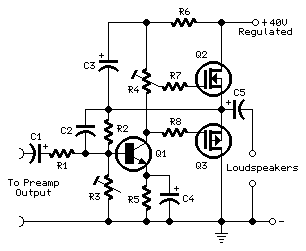This mini mosfet amplifier project was a sort of challenge: designing an audio amplifier capable of delivering a decent output power with a minimum parts count, without sacrificing quality. The Power Amplifier section employs only three transistors and a handful of resistors and capacitors in a shunt feedback configuration but can deliver more than 18W into 8 Ohm and up to 30W into a 4 Ohm load.
To obtain such a performance and to ensure overall stability of this very simple circuitry, a suitable regulated dc power supply is mandatory. This is not a snag because it also helps in keeping noise and hum of the preamp to very low levels and guarantees a predictable output power into different load impedances. Finally, as the amplifier requires only a single rail supply, a very good dc voltage regulator capable of supplying more than 2 Ampare/40V can be implemented with a few parts also.How to Setup of this Amplifier Circuit
- Connect the Power Supply Unit to the Power Amplifier
- Rotate the cursor of R4 fully towards Q1 Collector.
- Set the cursor of R3 to about the middle of its travel.
- Connect a suitable loudspeaker or a 8 Ohm 20W resistor to the amplifier output.
- Connect a Multimeter, set to measure about 50V fsd, across the positive end of C5 and the negative ground.
- Switch on the supply and rotate R3 very slowly in order to read about 23V on the Multimeter display.
- Switch off the supply, disconnect the Multimeter and reconnect it, set to measure at least 1Amp fsd, in series to the positive supply (the possible use of a second Multimeter in this place will be very welcomed).
- Switch on the supply and rotate R4 very slowly until a reading of about 120mA is displayed.
- Check again the voltage at the positive end of C5 and readjust R3 if necessary.
- If R3 was readjusted, R4 will surely require some readjustment.
- Wait about 15 minutes, watch if the current is varying and readjust if necessary.
- 12. Please note that R3 and R4 are very sensitive: very small movements will cause rather high voltage or current variations, so be careful.
- 13. Those lucky enough to reach an oscilloscope and a 1KHz sine wave generator, can drive the amplifier to the maximum output power and adjust R3 in order to obtain a symmetrical clipping of the sine wave displayed.
R1 : 2K2 1/4W Resistor
R2 : 27K 1/4W Resistor
R3,R4 : 2K2 1/2W Trimmers Cermet or Carbon (or 2K)
R5 : 100R 1/4W Resistor
R6 : 1K 1/4W Resistor
R7,R8 : 330R 1/4W Resistors
C1 : 22µF/25V
C2 : 47pF/63V
C3,C4 : 100µF/50V
C5 : 2200µF/50V
Q1 : BC550C NPN Transistor
Q2 : IRF530 N-Channel Hexfet Transistor (or MTP12N10)
Q3 : IRF9530 P-Channel Hexfet Transistor (or MTP12P10)
S: www.redcircuits.com


EmoticonEmoticon